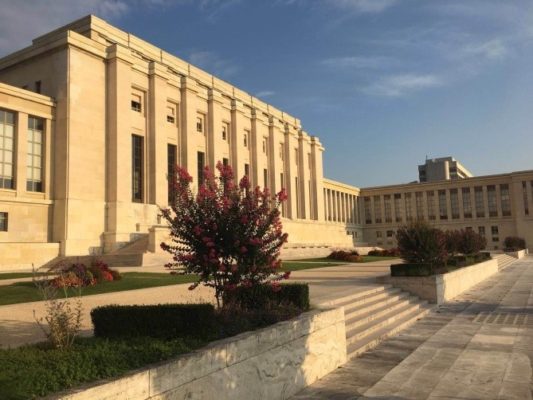
Geneva, Switzerland – From 13 September to 30 September 2016, Americans for Democracy & Human Rights in Bahrain (ADHRB) participated in the 33rd Session of the United Nations Human Rights Council (HRC) to highlight human rights abuses in Bahrain, Saudi Arabia, and the rest of the Gulf Cooperation Council (GCC). ADHRB delivered 20 oral interventions and organized two side events. The testimony and dialogue provided during the convention was well received by UN officials, who joined ADHRB in criticizing the human rights practices of GCC countries, particularly Bahrain.
Prior to the start of the 33rd session of the HRC, the Government of Bahrain renewed its wide-reaching repression of civil society. In line with the practice the government employed during the 32nd session of the HRC, authorities issued a blanket travel ban on Bahraini activists preventing them from engaging with the Council.
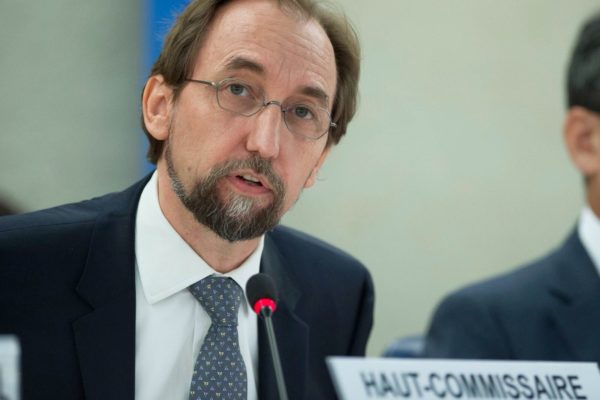
The UN High Commissioner for Human Rights, Zeid Ra’ad Al-Hussein, opened the first day of the Council with a comprehensive oral report on the status of human rights in the world, in which he strongly referenced the Government of Bahrain. The HC raised deep concerns regarding the human rights abuses perpetrated by the Bahraini authorities. He raised concerns over the incarceration of activists and revocation of nationalities without due process, as well as Bahrain’s poor engagement with UN recommendations. Calling the government’s response “disastrous,” he called on the government to “serve” rather than “smashing the voices of its people.” This comes after a public statement made by Bahrain’s Foreign Minister in August stated, “Bahrain does not care about any voice that tries to blackmail it from abroad, and particularly the Human Rights Council.”
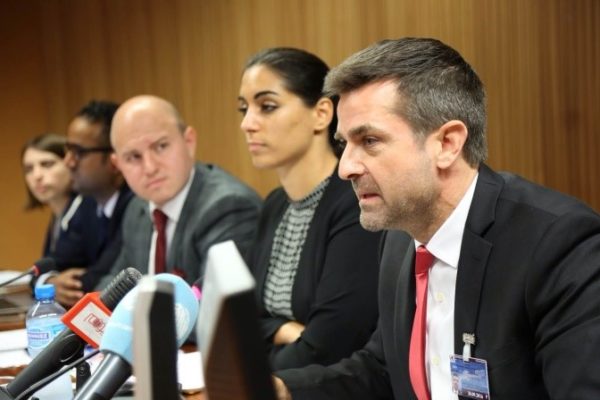
On the second day of the Council, ADHRB along with the Bahrain Institute for Rights and Democracy (BIRD), the Bahrain Center for Human Rights (BCHR), Amnesty International, FIDH’s Observatory for the Protection of Human Rights Defenders, Human Rights Watch, and Reporters Without Borders, held a panel event entitled “Closing civil society, religious and political space in Bahrain.” The panel included Sayed Yousif al-Muhafdha, Vice-President of the Bahrain Center for Human Rights (BCHR), Ariel Plotkin, Campaigner on Bahrain at Amnesty International, Dr. Dwight Bashir, Co-Director of the US Commission on International and Religious Freedom, and Laila Matar of Human Rights Watch in Geneva. During the event, ADHRB, BIRD, and BCHR released our new report analyzing all joint statements from the UNHRC, resolutions of the European Parliament (EP), and statements by the Office of the High Commissioner of Human Rights (OHCHR) and the UN Secretary-General since 2011. The report highlights that while the international community has certainly taken notice of the situation, verbal responses have proven ineffective to create meaningful change in Bahrain. The event on civil society space in Bahrain focused on recent actions taken by the Bahraini authorities to suppress activists and criminalize dissent. This included placing travel bans on Bahraini human rights activists preventing them from participating at the HRC. The panel noted the jailing of Nabeel Rajab and dissolution of the Al-Wefaq as signs that the government has no interest in open discussion, and is risking stability through extreme repression. Additionally, panelists agreed that the international community should encourage greater efforts by Bahrain to draw back its repression.

Important to note that prior to the start of HRC33, the Bahraini authorities placed a blanket travel ban on Bahraini activists attempting to leave the country to engage with the HRC in Geneva. This was a repeat attempt to silence any criticism at an international level as the authorities instituted the use of travel bans in HRC32. Notable activists placed on travel ban included Enas Oun, Nedal al-Salman, Ebtisam Al-Saegh, and Hussain Radhi. ADHRB submitted a complaint letter to the HRC presidency calling attention to these travel bans, which additionally limited the movement of human rights lawyer Mohammad al-Tajer, activist Ahmed al-Saffar, and trade unionist Jalila al-Salman and Taha al-Durazi.
On 13 September, Sayed Ahmed Alwadaei, on behalf of ADHRB, delivered an oral intervention during the interactive dialogue with the Working Group on Arbitrary Detention calling attention to arbitrary detentions in Bahrain. The intervention noted that not only does Bahrain arbitrarily detain an alarming number of people; the government focuses in particular on prominent political and civil figures. Such figures include longtime prisoners of conscience Hassan Mushaima and his colleague Dr. Abduljalil al-Singace, who have been in jail since 2011 despite worsening health conditions and international appeals. The intervention also called attention to Nabeel Rajab, who was again arrested on 13 June 2016 for his work as a human rights defender.
On 14 September, ADHRB gave an oral intervention under Item 2 referencing the high commissioner’s statement the day prior. In the statement Husain Abdulla, Executive Director of ADHRB, praised the High Commissioner for his office’s engagement with the issues in Bahrain. He went on to voice concern over the government’s clear campaign against its Shia community, which represents a majority of the Bahraini population. As evidence, Abdulla pointed to the recent denaturalization of the most prominent Shia cleric in Bahrain, Sheikh Isa Qassim. The revocation of Qassim’s citizenship in June has led to protests around the country, particularly in his hometown of Diraz, where protestors have been blockaded and arrested.
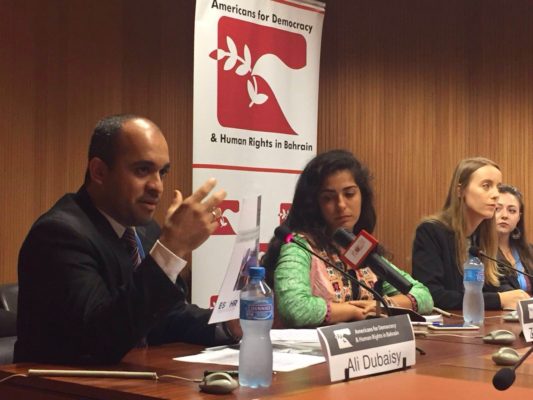
On 15 September, ADHRB, BIRD, the European Saudi Organization for Human Rights, the Institute on Statelessness and Inclusion, Kuwait Watch, and the Gulf Center for Human Rights organized a side panel event entitled “Bidoon: The Plight of Stateless Persons in the GCC.” The panel was moderated by ADHRB’s UN Liaison, Amanda Milani, who introduced the systemic discrimination and obstacles faced by stateless populations in the GCC. Ali Dubaisy, founder of the European Saudi Organization for Human Rights (ESOHR), highlighted the intentionally weak protections of the stateless Bidoon population as a key area of failure by the Saudi government. Zahra Al-Barazi, co-founder of the Institute on Statelessness and Inclusion (ISI), and Nawaf al-Hendal, founder of Kuwait Watch, both underlined the plight of the Bidoon population in Kuwait. Stateless populations in the Gulf continue to face extremely lacking citizenship application processes and neglect by government institutions.
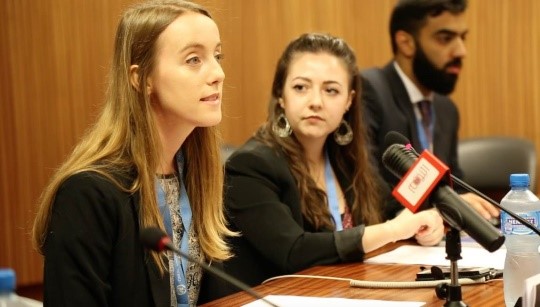
On 15 September, ADHRB’s UN Liaison Amanda Milani delivered an interactive dialogue intervention with the Independent Expert on the rights of older persons calling attention to older women’s limited access to healthcare as a result of the guardianship system in Saudi Arabia. Milani outlined how the lack of autonomy and control over life choices poses medical risks to women who are subjected to the guardianship system. Many medical institutions require written permission from a male guardian, meaning that even in emergencies such as a heart attack or stroke, care is often delayed. This, along with the risk women run by merely being in the presence of men creates major obstacles to proper treatment. The intervention ended asking the Independent Expert what measures the Saudi Government should adopt in order to better protect the rights of women.
On 15 September, Erin Sigmon, ADHRB’s Advocacy Assistant, delivered an oral intervention during the interactive dialogue with the Working Group on Enforced Disappearance and the Special Rapporteur on contemporary forms of slavery regarding the Emirati government’s use of enforced disappearances and the issue of debt bondage in Saudi Arabia. Sigmon expressed particular concern about the United Arab Emirates practice of regularly disappearing individuals for months or even years. She raised the case of Salim Al-Aradi, a Libyan-Canadian businessman who, alongside his brother Mohamed, were forcibly disappeared for 505 days beginning in August, 2014. Sigmon went on to challenge calls from Saudi Arabia to strike themselves from the report on contemporary forms of slavery. She pointed out that Saudi Arabia actively encourages debt-bondage labor through recruitment agencies that deceive migrant workers with abusive contracts.
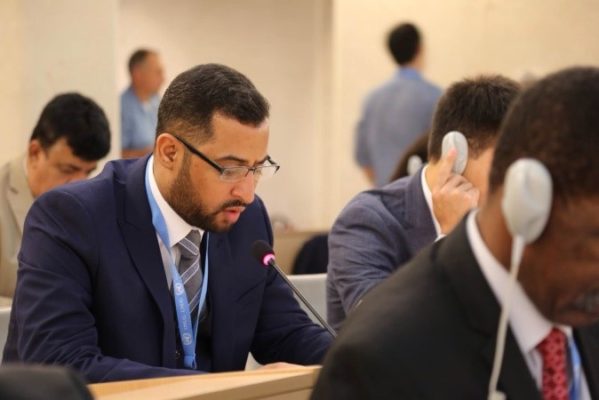
On 16 September, Yusuf Al-Hurri, on behalf of Americans for Democracy & Human Rights in Bahrain, delivered an oral intervention directed to the Working Group on the use of mercenaries on Bahrain’s use of foreign security forces during time of civil unrest. Al-Hurri criticized the narrow definition of mercenary laid out in the Geneva Conventions, which allows the Bahraini government to grant citizenship to foreign security forces to avoid reprisal. Since 2011 however, the government has been staffing police and the military with recruits from Pakistan, Malaysia, Indonesia, Sudan, and other countries. These foreign recruits live in isolated communities and do not receive linguistic or cultural training, polarizing them from the communities they are meant to serve. The intervention ended with Al-Hurri asking what steps can be taken to ensure that member states, like Bahrain, no longer continue abuse legal loopholes to deploy mercenaries during periods of civil unrest.
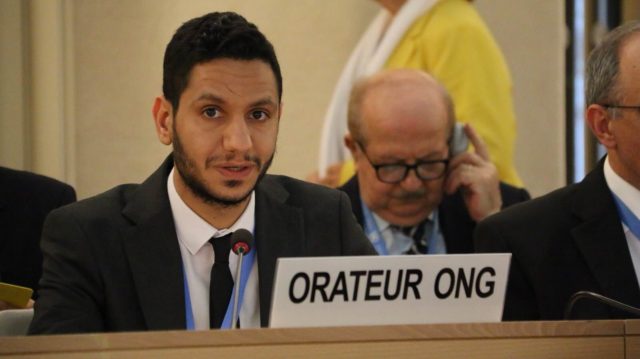
On 16 September, Sayed Ahmed Alwadaei, Director of Advocacy at BIRD, delivered an oral intervention on behalf of ADHRB under the agenda item 3 general debate on the use of arbitrary detentions by the Government of Bahrain. Alwadaei shed light on the increasing trend of arbitrary detention and torture, which the government has remained entirely opaque about. One recent development is the targeting of Shia protesters after the revocation of Isa Qassim’s citizenship, in which dozens have been detained for peacefully protesting. Alwadaei also mentioned currently held prisoners Mohamed Ramadhan, Husain Moosa, Abbas Alsameeaa, Sami Mushaima, Ali Al-Singace Mahir Alkhabaz and Salman Isa. Alwadaei called on all states, particularly Bahrain, to end the practice of arbitrary detention, and called for the immediate release of all who are being unjustly held.
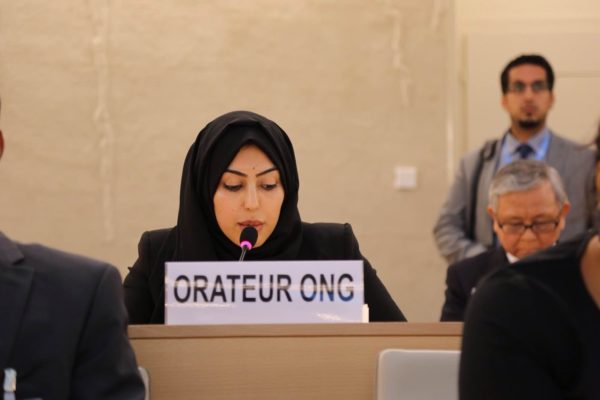
On 16 September 2016, Zena Al-Esia, Research Associate at the European Saudi Organization for Human Rights, also delivered an oral intervention on behalf of ADHRB under item 3 on the use of arbitrary detentions by the Government of Saudi Arabia. Al-Esia expressed concern over the policy engrained in Saudi Arabia’s legal system of holding individuals for months or even years without any charge. These arrests are nearly always politically motivated, such as participating in protests or leading human rights movements. Al-Esia pointed out cases such as Murtaja Al-Qurayrees, a boy arrested for attending a protest at age 13, who has been held for two years without any official charge. Other arbitrarily held political prisoners that were mentioned included Fahad Al-Fahad, Israa Al-Ghomgham, and Naima Al-Matrood. Concern was also raised about the use of torture and execution against minors, particularly the four who have been executed so far in 2016. The intervention concluded with a call for all states, including Saudi Arabia, to end the practice of political executions, unfair trials, and immediately halt imposition of the death penalty against minors.
On 19 September, Yousif Al-Hurri on behalf of ADHRB, delivered an oral intervention under Item 4 on the escalating human rights crisis in Bahrain. The intervention began by addressing the arrest and detention of Nabeel Rajab, President of BCHR. Rajab is facing up to 16 years in prison for his political commentary, in particular a series of a tweets and an open letter published by the New York Times. Al-Hurri went on to catalogue the intensifying campaign against political dissent in Bahrain. He noted the issuance of travel bans leading up to the convention, the dissolution of the Al-Wefaq society, extension of Sheikh Ali Salman’s sentence, revocation of Isa Qassim’s citizenship, and the crackdown against peaceful protestors. The intervention ended by calling for the establishment of a Special Rapporteur on Bahrain that will document further human rights developments in the kingdom and report these findings to the Council.
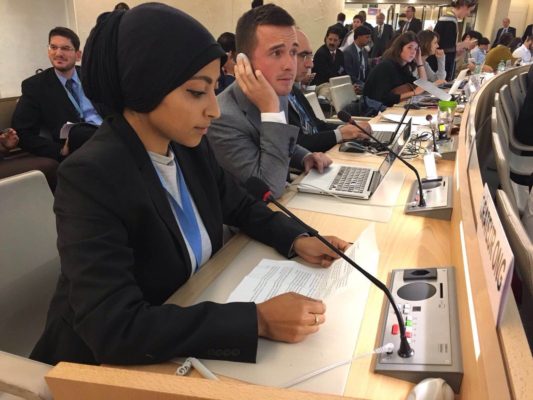
On 19 September, Maryam al-Khawaja, Co-Director of the Gulf Center for Human Rights (GCHR), delivered an oral intervention on behalf of ADHRB during the Item 4 General Debate. The intervention outlined how human rights abuses in Bahrain are institutionalized and systematic. One area where this is evident is in the use of arbitrary detention against political figures, as there are now almost 4,000 political prisoners in Bahrain. Notable among these are the ‘Bahrain 13’ a group of activist leaders who were rounded up during the 2011 protests and given either life or 15 years in prison. Next Al-Khawaja pointed to the use of denaturalization, which has led to over 300 Bahrainis losing citizenship, the majority of whom are human rights defenders, political opposition figures, academics, or Shia religious leaders. Al-Khawaja called on the council to pass a resolution insisting Bahrain release all prisoners of conscience an impose mechanisms of accountability.
On 20 September, Erin Sigmon, Advocacy Assistant at ADHRB, delivered an oral intervention during the Panel Discussion on Violence against Indigenous Women and Girls. The intervention raised concerns regarding the policies of discrimination against Bidoon women in Kuwait and Saudi Arabia. Sigmon pointed out that the issues facing all Bidoon, which largely stem from lack of proper documentation since birth, have extreme effects against the female population. One point in particular was the inability of many Bidoon women to give birth in public hospitals, leading to extreme medical risks to both mother and child. Largely at issue is the inability of citizen women to pass their citizenship onto their children, creating a cycle and expanding the problem of statelessness. Both Saudi Arabia and Kuwait are in violation of their international obligations by not allowing their indigenous people to gain citizenship.
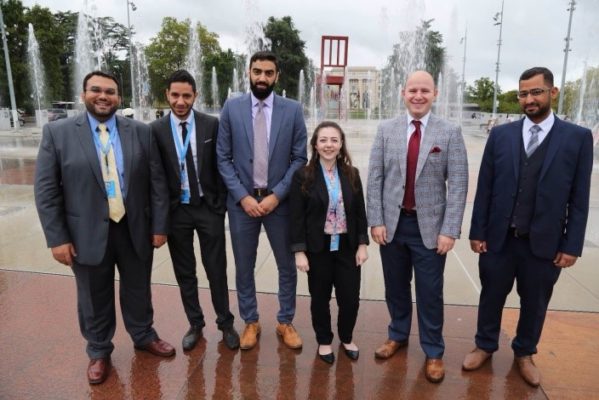
On 20 September, Erin Sigmon, delivered another oral intervention during the interactive dialogue with the Special Rapporteur on indigenous peoples on discrimination against the Bedoon population in Kuwait. Before beginning the speech, a few words of remembrance were given for Nasser al-Ras, a Bidoon activist who had died earlier that day. Sigmon went on to advocate for the roughly 112,000 stateless Bidoon living in Kuwait, who are neglected by the government and face severe obstacles. The Bidoon are incapable of participating in the political process, and have been officially banned from protesting in public. The statement asked for recommendations from the Rapporteur on how Kuwait can support and protect the rights of the Bidoon.
On 23 September, GCHR’s Maryam al-Khawaja, delivered another oral intervention on behalf of ADHRB, this time under agenda item 5. The intervention focused on the reprisals against human rights defenders and civil activists who attempted to engage with the Office of the High Commissioner on Human Rights (OHCHR). In particular, the use of travel bans to prevent members of the Bahrain Human Rights Observatory, Al Wefaq Society, and other civil figures from testifying before the 33rd HRC. In contrast, the government sent its largest delegation to date including members of the government run National Institute for Human Rights. Khawaja ended by calling on the council to publically and forcefully denounce such reprisals against an open and effective HRC.
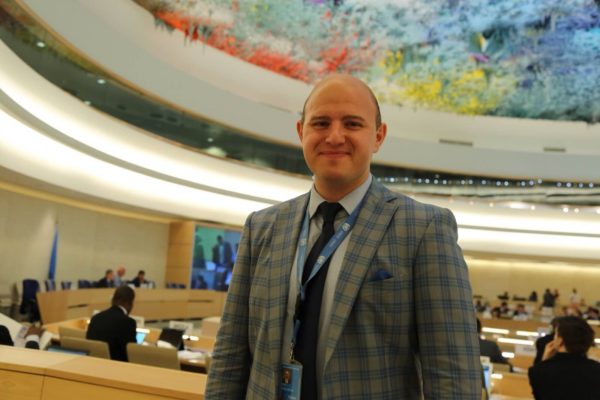
On 23 September, ADHRB International Advocacy Officer Michael Payne delivered an oral intervention during the Item 5 general debate. In the intervention, Payne pointed to the long-standing and ongoing human rights violations by the Government of Saudi Arabia as evidence that they should not be re-elected to the HRC this October. Saudi Arabia has used its position on the council as diplomatic weight to silence civil society and bully the UN and other states. The Saudi government has jailed and imposed travel bans on citizens that attempt to engage with the UN HRC mechanisms, and recently strong-armed Ban Ki-Moon to remove them from the Child’s Rights blacklist. The government both actively works against the interests of the council and perpetuates the exact behavior the council exists to fight. Payne called on all states, which profess to care about human rights, and the integrity of the UN to oppose Saudi Arabia’s continued membership.
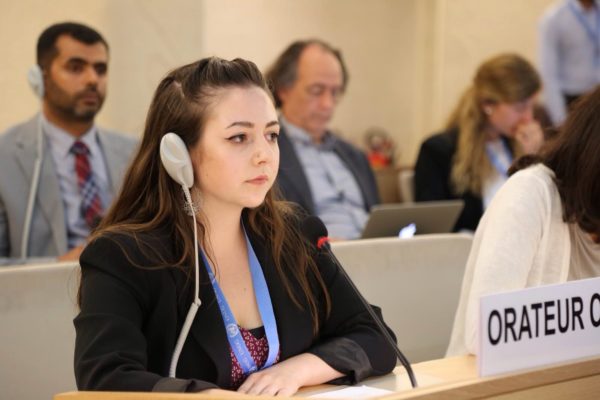
On 23 September, Erin Sigmon, delivered her final oral intervention during the item 6 general debate calling attention to the upcoming periodic review of Bahrain. Referencing the ADHRB assessment of Bahrain’s 2012 review, Sigmon pointed out that of the 158 recommendations the government accepted, only three have been fully implemented. Four years since the last review, there have been almost no progress on issues identified in the criminal justice system, the use of torture, or attacks on free expression, assembly, speech, and belief. Instead, the government has intensified restrictions and punitive measures through anti-terror and cybercrime laws. Sigmon concluded by calling on the council to follow-up on the implementation of the 2012 recommendations, and account accountability deficits while conducting upcoming review.
On 26 September, Tariq Alsabahi on behalf of ADHRB, delivered an oral intervention under item 8 regarding violations of the right to freedom of expression by the Government of Oman. Alsabahi largely focused on attacks against the press, a particularly relevant issue this week after the Omani government shut down the Azaman Newspaper. The newspaper was shut down after an article criticized the country’s judiciary and its editor-in-chief along with two journalists were jailed. Two were given three-year sentences and the other was given a one year sentence. Another writer, Abdullah Habib, was placed in solitary confinement for three weeks in April after writing a historical overview of the South Oman war, which happened over forty years ago. Another writer was held in solitary confinement for over a month after he reported on the jailing of Abdulla Habib. Alsabahi ended by calling on Oman to release detained journalists and uphold its international and domestic commitments to free expression in the press.
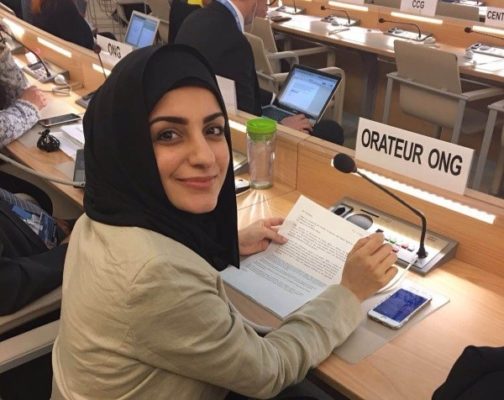
On 26 September, Asma Darwish, Advocacy Officer at BCHR, delivered an oral intervention on behalf of ADHRB under the Working Group on the people of African descent. Darwish called attention to the racism faced by Afro-Bahrainis, many of whom have lived in the country for centuries as a result of the Saharan slave trade. Afro-Bahrainis are heavily discriminated against in all sectors, not least of all in public employment. A study examining high-level positions across 22 governmental bodies covering 415 positions found that less than 1% were held by someone of African descent. Afro-Bahrainis are also largely excluded from Bahraini media, and when mentioned are often unfairly represented and portrayed as inferior to the broader community. Afro-Bahraini’s face structural racism in education and classrooms often understate or completely omit slavery and its abolition. Darwish called on all states to combat institutional racism and asked the working group to give more attention to people of African descent living in Arab states.
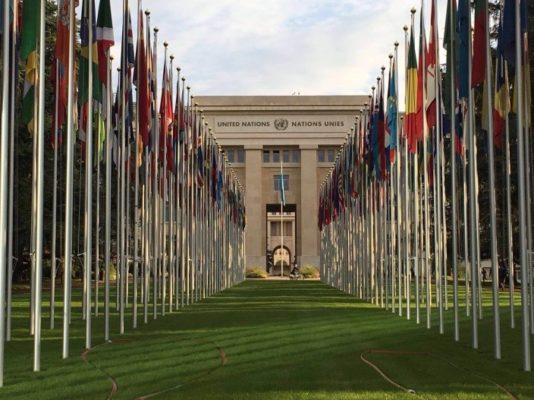
On 27 September, Asma Darwish also delivered an oral intervention under item 9 focusing on discrimination against Shia in Bahrain. Darwish informed the Council that there is a serious and growing threat of sectarian discrimination to stability in Bahrain. She cited hate speech utilized by the Government to discredit political opposition and stoke societal division. Additionally, authorities have tolerated and even encouraged sectarian hate speech against the Shia, citing this entire religious community at “terrorists” and “Iranian agents” in official media. A recent study revealed that the government and its supporters have created thousands of automated Twitter accounts to disseminate sectarian hate speech. Darwish ended the intervention by calling on the Bahraini authorities to stop its endorsement of sectarian hate speech against the Shia and to ensure the right of Shia and other religious and ethnic minorities to non-discrimination.
On 29 September, Asma Darwish delivered ADHRB’s last oral intervention at the HRC, which focused on Bahrain’s lack of cooperation with OHCHR. The intervention noted that Bahrain has created an extremely hostile environment for OHCHR’s technical cooperation and capacity building programs, imprisoning human rights defenders, deporting religious leaders and dissolving the main political opposition group. Moreover, Bahrain has made a conscious effort to undermine the authority of the High Commissioner and his offices, calling into question its independence and impartiality. Darwish ended the intervention calling an end to all reprisals against civil society.
On the same day, Yusuf al-Hurri delivered two interventions under agenda items 9 and 10. Under item 9, al-Hurri addressed issues of hate speech and religious discrimination in GCC states, including Saudi Arabia, Kuwait and the UAE. Under item 10, al-Hurri raised issues relating to Saudi Arabia’s cooperation programs with OHCHR, in particular, that the kingdom’s current cooperation agreement with the Office, conclude at the end of 2016, and called on Saudi Arabia to renew and expand its program to include civil society participation and transparency measures for accountability.
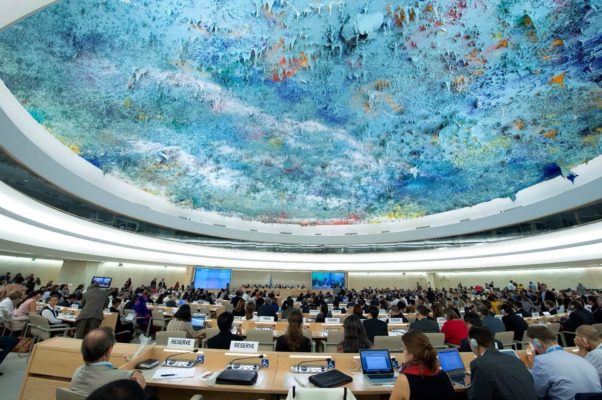
While the HRC failed to pass a statement or resolution on Bahrain, a number of states did call attention to the situation in the country. Switzerland remained concern with the dissolution of Al-Wefaq and the heavy sentencing of opposition leader Sheikh Ali Salman. Switzerland also raised concern regarding travel bans on Bahraini civil society, citing actions it as exacerbating “an already tense situation.” Additionally, the country called on Bahrain to uphold its international obligations and respect freedom of expression and assembly. Czech Republic called attention to cases of Sheikh Maytham al-Salman and Sheikh Isa Qassim, who are just some of the Shia clerics targeted by the Bahraini authorities. Norway also remained concerned regarding the increased pressures facing human rights defenders and the shrinking space for civil society in the GCC.
NGOs, including Article 19, Human Rights Watch, and Amnesty also called attention to the human rights situation in Bahrain. They mentioned cases of activists such as Ghada Jamsheer and Nabeel Rajab. NGOs also highlighted the restrictions on freedom of speech and assembly, and called on Bahrain to cooperate with UN special procedures.
For a PDF of this statement, please click here.





